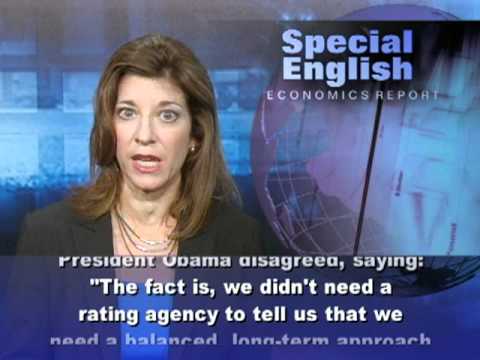Debt, Recession Worries Bring Volatility to World Markets
 |
This is the VOA Special English Economics Report, from voaspecialenglish.com | facebook.com/voalearningenglish
A "rollercoaster ride" is one description for the days of historic ups and downs in stock markets recently. If you want to use a more technical term, the markets have experienced volatility -- in a big way. Major measures of United States markets closed with their biggest one-day losses since the financial crisis of two thousand eight. Asia and Europe also had sharp declines.Volatile markets can react suddenly in wild and unpredictable ways. Usually some kind of shock, or more than one, is involved. For example, on August fifth, one of the three major credit rating agencies downgraded long-term United States government debt. Standard & Poor's lowered its opinion of Treasury securities one step from the highest rating, triple-A, to AA-plus. But shocks like a hopeful jobs report or good earnings results can stop a fall and send prices higher. Also, when prices fall, investors may find good deals and start buying. The United States held S&P's top rating for seventy years and never had a downgrade. But many investors were expecting that to happen even after the budget deal in Washington. In early August Congress agreed to increase the government's borrowing limit in return for steps to cut spending and reduce the deficit. S&P says it thinks America's debt will only increase in the future. President Obama disagreed, saying: "The fact is, we didn't need a rating agency to tell us that we need a balanced, long-term approach to deficit reduction." He said markets still consider United States credit "as among the world's safest."Still, there have been growing worries of another recession -- a double dip. On August ninth, policy makers at the central bank said economic growth so far this year has been "considerably slower" than they had expected. The Federal Reserve said it would likely keep short-term interest rates near zero for at least two more years.Borrowing costs for the United States remain very low. But debt worries in two of Europe's biggest economies have increased costs for their governments in recent weeks. On August eighth, the European Central Bank began buying debt securities from Spain and Italy. These efforts helped push down interest rates for those countries. But Europe must still deal with the rescues of Greece, Ireland and Portugal. For VOA Special English, I'm Carolyn Presutti. For more business news and to learn American English, go to voaspecialenglish.com.
(Adapted from a radio program broadcast 12Aug2011)
|




